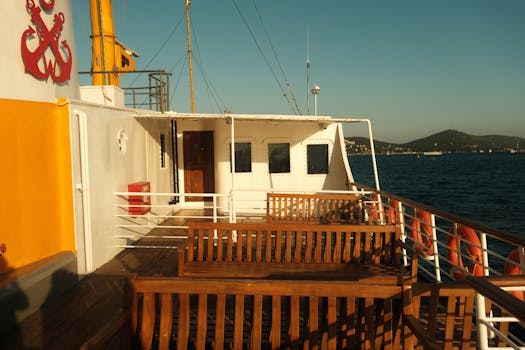You could do a college course like an introduction to cabin crew, or study a cabin crew module as part of a broader travel and tourism course.
Entry requirements
Entry requirements for these courses vary.
A cruise ship crew member works aboard cruise ships, providing services to guests and ensuring the smooth running of ship operations. Roles can vary widely and include hospitality positions such as waiters, housekeepers, and bar staff, as well as entertainment, technical, and deck crew jobs. Crew members often work long hours and live on board the ship for several months at a time, visiting many destinations around the world. Teamwork, customer service skills, and adaptability are essential in this career. It can be a rewarding way to travel and meet new people while gaining valuable experience in the hospitality or maritime sector.

Cruise ship crew members in the UK typically earn between £16,000 and £35,000 per year, depending on role and experience.
There are around 5,000 UK nationals employed on cruise ships worldwide, with many more opportunities available as the industry grows.
Over 2 million UK residents took a cruise in 2023, fuelling demand for a wide range of cruise ship crew positions.

Responsible for organising and leading activities, games, and shows for guests on board a cruise ship.

Takes care of cleaning and maintaining passengers' cabins, ensuring high standards of cleanliness and guest comfort.

Plans and supervises activities and programmes designed for children and teenagers travelling on the cruise.
Start by working in hotels, restaurants, or customer service roles to develop essential skills.
Employers look for candidates with a strong background in hospitality or tourism, as many cruise ship jobs focus on passenger comfort and service. Part-time or weekend jobs in restaurants, cafes, hotels, or theme parks help you gain practical experience dealing with customers, handling complaints, and working as part of a team. You can also consider volunteering at events or local venues to further enhance your experience.
Complete GCSEs and consider courses in hospitality, travel, tourism or languages.
While formal qualifications are not always required, having GCSEs (including English and Maths) is often expected. Courses such as a Level 2 or 3 Diploma in Hospitality, Travel and Tourism, or learning additional languages can give you an advantage. These qualifications can be achieved through college or apprenticeships, and language skills are especially valuable for working with international guests.
Learn about different cruise companies, their routes, and job opportunities.
Major cruise lines include companies like P&O, Royal Caribbean, and Carnival. Each company offers various roles, from housekeeping and catering to entertainment and technical positions. Visit their careers websites, read employee testimonials, and join online forums to understand what life is like on board and what employers are looking for in applicants.
Familiarise yourself with the unique challenges and lifestyle of working at sea.
Working on a cruise ship involves long hours, living away from home for extended periods, and sharing accommodation with colleagues from different countries. You must be adaptable, resilient, and able to work in a multicultural environment. Watch documentaries, follow social media accounts of cruise crew members, or attend career fairs to get an honest insight into shipboard life.
Search and apply for entry-level positions on cruise line career websites or through recruitment agencies.
Common entry-level roles include housekeeping, bar staff, waiters, or entertainment assistants. Prepare a CV that highlights your relevant experience and language skills, and write a cover letter tailored to each employer. Some positions may require you to attend interviews online or at recruitment events. Agencies that specialise in cruise recruitment can also help you find opportunities.
Attend mandatory safety courses and pass a medical exam before you can work at sea.
Before joining a ship, you must complete the STCW (Standards of Training, Certification and Watchkeeping) safety training, which covers basic first aid, firefighting, and survival at sea. You will also need a seafarer medical certificate to prove you are fit for work on board. Your employer will provide guidance or arrange this training as part of the onboarding process.
Explore relevant apprenticeships that can help you kickstart your career in Cruise Ship Crew Member. Apprenticeships offer hands-on experience and training while earning a wage.
This page showcases various career options and the pathways to reach them. Each career listed here shares transferable skills and knowledge, making it easier for individuals to transition between them.
Your current career is highlighted to help you see how it fits into the broader landscape of potential career choices. By clicking on any career, you can learn more about it, including the training and education required to pursue it.
Remember, progressing in your career often involves further learning and training. This page provides insights into future career options as well as those that can lead up to your current one.
These career progression decisions are informed by comparing the skills and knowledge needed for different occupations, along with data on how people move between them. Explore the possibilities and discover the exciting journey ahead in your career!
A Cruise Ship Crew Member and Cabin crew both involve providing passenger services, ensuring safety, and maintaining the comfort of guests on a vessel. They require similar hospitality and customer service skills, making them closely related in terms of qualifications.
You can get into this job through:
You could do a college course like an introduction to cabin crew, or study a cabin crew module as part of a broader travel and tourism course.
Entry requirements for these courses vary.
You could apply to do a Cabin Crew Level 3 Advanced Apprenticeship.
This will take around 12 months to complete. You'll do on-the-job training and spend time with a college or training provider.
You'll usually need:
You could apply directly to airlines for a cabin crew job. Airlines set their own entry requirements, which can vary.
You'll be expected to have a good standard of spoken and written English. You'll also need to show that you have great customer service skills, so experience of working directly with the public is useful.
Some airlines and private training providers run short cabin crew preparation courses, which may help your chances of getting a job, though these are not essential.
Certain airlines have online career quizzes you can do to test whether working as air cabin crew is for you, before you apply.
Being able to speak a second language may give you an advantage for some jobs.
Explore other careers or use our AI to discover personalised paths based on your interests.
Address
Developing Experts Limited
Exchange Street Buildings
35-37 Exchange Street
Norwich
NR2 1DP
UK
Phone
01603 273515
Email
[email protected]
Copyright 2025 Developing Experts, All rights reserved.
Unlock expert-designed lessons, resources, and assessments tailored for educators. No credit card required.
Claim Your Free Trial →